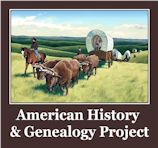Sketches & Portraits ~ Chisholm to Godbe
The following pages contain Sketches
and Portraits of some of the sturdy men who have passed away but
who had an important part in the development of this great
region.
The work they accomplished will live
long after the shafts reared in their memory have fallen to
decay.
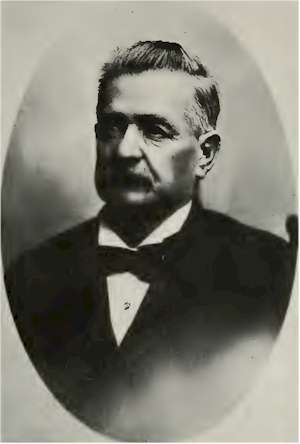
Chisholm, William Wallace
It was in the
year of 1864 that the late William W. Chisholm arrived in Utah,
where he was destined to become one of the best-known and most
representative citizens in the inter-mountain country. Residing
in Salt Lake City from 1889 up to the time of his death, he was
at all times a useful and public-spirited citizen, and his loss
is deplored by all who knew him.
He was a native of Hazel Green, Grant
County, Wisconsin, and was born June 26, 1842. His father was
Robert Bruce Chisholm, and his mother, Sarah Van Valkenburg
Chisholm. Before settling in Wisconsin the elder Chisholm
resided in Chicago, and was a large property owner there,
including the lots upon which the Tremont Hotel stands. He was a
pioneer in Chicago, and was a brick manufacturer, and was also
interested in mining. W. W. Chisholm received an early education
at Hazel Green, and in 1854 he went to Monona, Clayton County,
Iowa, to live with an uncle, who was a cabinet-maker, which
occupation young Chisholm followed for two years and then
learned the printer's trade at Winona, Wisconsin, securing
employment on the "Democrat," where he worked for the first year
for fifty dollars. In 1863 he went to Elgin, where his father
had bought a farm, and there he made his home and attended the
Elgin Academy. In 1864 father and son started for the West by
stage to Omaha, and there they purchased mule teams and wagons
and started for Virginia City, Montana, reaching there in
September of that year.
His first occupation after arrival in
Utah was as a wood-chopper, and the following spring worked some
mining claims, without success. Mining was then in its infancy
in Utah. In the meantime the elder Chisholm had located claims
in the Pahranagat Mining District, and in 1865 father and son
returned east and disposed of them for cash.
In the spring of 1866 W. W. Chisholm
went to Chicago to follow his trade of printing, securing
employment on the "Post," where he remained for three years, and
again returned to the West by rail, arriving in Utah May 10,
1869, the day of the meeting of the Union Pacific and Central
Pacific at Promontory. Here he joined the late Captain Woodman
at Bingham, and went with him to Little Cottonwood, where the
Emma Mine had been located. He assisted Captain Woodman in the
management of that property and was, in fact, the manager, the
Captain having so many interests to handle. He remained with the
Emma until 1872, when the Walker brothers obtained control of
the property; then he retired. Returning to Salt Lake, he
devoted his time to looking after his father's property, and his
own mining interests throughout the State.
On the 9th of February, 1876, Mr.
Chisholm was married to Miss N. Jeanette Kendall, sister of J.
D. Kendall, who subsequently became his most intimate business
associate. The same year the Centennial-Eureka Mine was located,
but nothing much in the way of development and production was
accomplished until September, 1884, when Mr. Kendall was put in
charge. Operations then began with energy, and the mine was
developed and became a great producer under his able management.
By the recent death of Mr. W. W. Chisholm, which occurred at Los
Angeles, March 19, 1909, Utah loses one of its most prominent
mining men, as well as a useful and honored citizen.
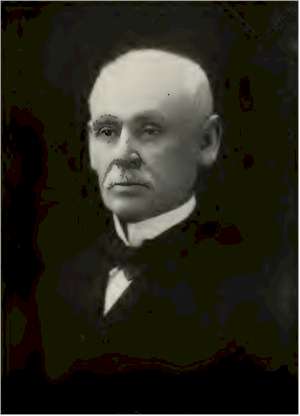
Falk, David
David Falk was born in Eggenhausen,
Bavaria, Germany, on December 18, 1834. In 1850 lie came to
Portsmouth, New Hampshire, where he clerked in the store of
Blumaner & Dottenheim. In 1859 he crossed the Isthmus of Panama
and opened a store at the mouth of Sandy, near Portland. In 1862
he moved to Dalles, where he became a member of the firm of
Block & Co.
Mr. Falk came to Boise in 1864, when he and Mr. Block became
members of the firm of Hessberg & Co., who afterwards sold out
to Falk and Kraemer. He commenced the present business with his
brother, Nathan, in the fall of 1868, under the firm name of D.
Falk & Bro., and was continuously connected with the business,
having been one of the directors at the time of his death.
In 1866 at Strasburg, Germany, he was married to Miss Ernestine
Weil, who, together with four children, Leo F., Henry, Mrs.
Julius Steinmeir of Boise, and Mrs. E. E. Manheim of Fresno,
California, survive him. He is also survived by a brother,
Sigmund Falk, and two sisters, Mrs. H. Seller of Boise and Mrs.
M. Stark of Bavaria, Germany.
Mr. Falk devoted no little of his time and a great deal of his
money to mining, one of his ventures in the Wood River country
having cost him a fortune. He erected the first smelter in
Idaho, in Wood River, in 1881. He was also largely interested in
the development of Atlanta, having been one of the owners of the
Petitt mine. Mr. Falk was one of those who had unbounded faith
in the resources of his State, to the development of which he
gave the best years of his life. When he had done he had
demonstrated possibilities that others were not slow to see, and
they took up the labors where he had been forced to suspend his
operations and, profiting by the results of his energy, in
numerous instances were able to add many thousands of dollars to
the wealth of Idaho. Mr. Falk was ever ready to show his faith
in the State of his choice by his acts, and until sickness
overtook him and compelled him to retire, he was actively
interested in various matters in addition to the great
mercantile establishment he had founded.
During his long and useful career he held the confidence and
high esteem of all those with whom he came in contact, either in
a business or social way. Mr. Falk was a member of the Masonic
Fraternity, the Pioneer Society, and a charter member of the
Boise Relief Society.
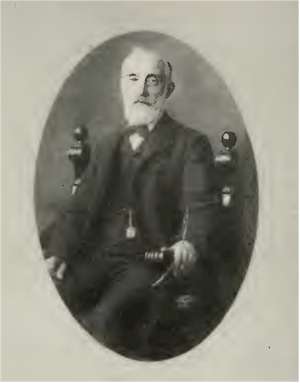
Falk, Nathan
History shows that in every family, in
every community, and in every subdivision of our social state,
there is a leader, one who plans and executes ideas beneficial
to the welfare of the family or community in which he is
interested. Such a man and such a leader was Nathan Falk to the
city of Boise.
Nathan Falk was born in Eggenhausen, Bavaria, in the year 1848.
He came to the United States when a lad of fifteen years. He
spent a short time in New York City, but soon took passage for
San Francisco, by way of the Isthmus of Panama. He spent a
little time in San Francisco, Portland and The Dalles, Oregon,
but the spring of 1864 found him in Boise, which was his home
from that day to the day of his death, July 22d, 1903. Boise in
those days was a small village, the trading point for Boise
basin mines. It was due to the foresight, the untiring energy
and the business ability of such men as Nathan Falk that Boise
is today the capital and metropolis of the State of Idaho, and
the finest and most progressive city of its size in the United
States. Many were the hardships endured by those early pioneers,
and their experiences during their overland trips to and from
the markets would fill many a volume.
Nathan Falk was a man who took a large interest in public
matters, and, while never in politics, was ever ready to give up
his time for the public good. A natural born merchant,
possessing a sense of justice and philanthropy that is given to
but few men, he soon rose to control the largest business in the
State of Idaho. For many years he directed the course of the
Falk Mercantile Company, and the indelible impress of his
personality today, six years after his death, still dominates
the policies pursued by the great company which bears his name.
His was a simple creed, "Do unto others as you would have others
do unto you, and, do it now." His sterling integrity, keen
foresight and executive ability made hosts of friends for him,
and his advice was eagerly sought by rich and poor alike, and
given as freely and honestly to one as to the other. His life
was one of unselfish devotion to his family, and his sons are
today following in the footsteps of their father, and taking an
active and leading interest in the Falk Company.
At the time of his death, the "Daily Statesman," the leading
paper of Idaho, said:
"By the untimely death of Nathan Falk, this city and the State
of Idaho sustain a loss so great that it seems almost
irreparable. No city can afford to lose such a man, and the
'Statesman' voices a universal sentiment in saying there are
few, if any others, whose death would create such a void.
Yesterday was a day of mourning throughout the entire city, for
all our people loved the dead merchant, and all feel a sense of
personal loss in his taking-off. Nathan Falk was a model man of
business, a model husband and father, a model member of society.
There is no point at which one can touch his character and
disclose a flaw."
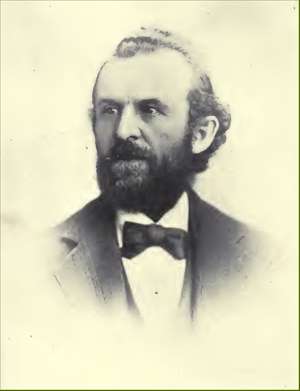
Godbe, William S.
The subject of this sketch was born in
London, England, June 26, 1833. He was as a boy, bright,
sensitive and brave, and while yet a child took in a belief that
his own country was the greatest in the world, because his
forefathers had, while maintaining themselves against the world,
subdued themselves and disciplined themselves until order with
them was a rule, and obedience to law a duty which might not be
avoided. At the same time he discerned that, throughout all the
mutations of the centuries, the one paramount thought that had
become fixed in every English mind was that the freedom of the
citizen, and his inherent right to do any legitimate thing, that
is, anything which did not trench upon the rights of his
fellowmen or the rights of society, was an inalienable
birth-right.
It was at a time when England had just begun her mighty
expansion. Her triumphs, first under the battle canopy of
Trafalgar, then at Waterloo; her lead in the manufactures of the
world; her possession of more ships and money than half the
world outside, were all witnesses of a measureless power and
incentive for all Englishmen to make the utmost exertion for
wealth and place. Then in his childhood, the genius of that
mighty array of British intellectual lights, Scott, Burns,
Byron, Macaulay, Keats, Coleridge, Campbell, and the others, had
just attained full voice, and the first splendors of the
Victorian era were shining about him. No wonder that an eager,
alert soul like his should be surcharged with ambition and
enthusiasm.
While yet a youth, he determined to take in the world and so
bound himself to a ship company, and when he sailed on his first
voyage his soul was in full accord with the wild winds above and
the never resting sea that rolled around him. In early youth he
has read all the classics, and as he sailed from his native
shore, he exulted in the thought that the life he had chosen
would lead him to the lands where those who had shaken the world
in the long ago, the heroes, the orators, the poets, the artists
of the early ages, had lived, and wrought, and died.
Then the question of the Turk and Greek was stirring the world.
Byron, an Englishman, had just died in an effort to help the
latter nation, that nation around which so much glory lingers.
So he visited the Grecian isles, spent a good while in
Constantinople, went over to southern Russia and up the Danube,
then across to Egypt, along northern Africa, across to Brazil,
then, returning, took in northern Europe. His journeys were
continuous studies; as he neared a coast, all that was famous in
the history of that coast was familiar to his mind, and the
voyage was but a postgraduate course in which to complete his
studies. He spent a good deal of time in France, Germany and
Denmark. He was more than once shipwrecked. In those years he
took in more information than he could have gained in half a
century on shore, and the discipline he underwent, in after
life, made difficulties which would have baffled the ordinary
man seem but trifles to him.
At the same time, a life at sea grew, after a long experience,
irksome. It was hitch-ing a blood horse to a whim and driving
him in a circle day after day, when his real nature was to go
out and, through campaigns that taxed all his energies and
strength, win his conquests. He was on the swift road to become
a captain and to sail his own ship, but that meant simply an
enlarged sphere; the old, narrow routine would still have been
his, when he held in thought the whole world and its
possibilities for him. But who can estimate what the discipline
of the sea was to him in after life?
He returned to England and completed his apprenticeship in a
ship-chandler's office. That for him consisted mostly of heavy
physical labor, the dragging of ship stores to ships along the
docks.
While thus engaged he one day heard the preaching of a Mormon
elder. Here was something new an appeal for a return to
primitive Christianity. The imagination of young Godbe was at
once enlisted. Before, his vision had been confined to this
world; now he took in both heaven and earth. He at once procured
some Mormon books and the writings of Parley Pratt kindled a new
flame in his soul. He became a convert, attended the Mormon
meetings, "bore his testimony" with passionate fervor, for at
the time he hailed the new faith as a miracle wrought for man's
salvation, and his youthful fancy surrounded it with all the
splendor of that light which comes from the celestial chambers,
were divine light is brewed.
Then the martyr's spirit absorbed him; the glory that was to be
in founding and building up his faith in the wilderness of
America engrossed him, and he sailed from his native land to
join the work.
He left London as a sailor, and, reaching New York, he had only
what money he had earned on the voyage. He struck out on foot
for Utah. He walked to Buffalo, then worked his passage on a
boat to Chicago, then again started on foot and walked to the
frontier, where he obtained employment in a train loaded with
merchandise for Salt Lake in 1851.
He engaged in business with a merchant, Mr. Thomas S. Williams,
and in a few years, by incessant industry and through that
courage of his which never faltered, amassed a comfortable
fortune.
In those early days a man who understood the needs of the city,
and who likewise understood the art of purchasing the best goods
at the lowest prices, was essential in Salt Lake, and Mr. Godbe
was exactly the man for the place.
So he made annual journeys east, to purchase his own goods, and
to act as the commercial agent of the people. The day of his
starting was advertised annually, and then for days his office
was thronged with men and women from all over the Territory
giving their individual commission for him to fill, and in the
autumns when the trains arrived with these goods, the rush for
them made a periodical sensation.
Before the completion of the Union Pacific Railroad Mr. Godbe
had crossed the plains twenty-four times to the Missouri River,
besides making several trips to California by the northern,
central and southern routes. These trips he made by horseback
generally, but always by his own conveyance, and in some
instances only one man accompanied him. This was when the
Indians were bad, and he deemed it safer to travel without
attracting too much attention. He also crossed the Atlantic
seventeen times.
Mr. Godbe, too, was the first man in Utah to bring down the
price of merchandise, adding but a reasonable percentage to cost
and freight.
As his fortune accumulated he built the Godbe Building, corner
of First South and Main Streets, which, with Mr. William
Jennings' emporium across the street, were really the first
substantial buildings erected in the city. The Walker Bros,
store, corner of Second South and Main, was soon after erected.
By his enterprise and generosity and public spirit, Mr. Godbe
had drawn to him the affections of thousands of people and the
good will of all the rest. But he had at the same time become
disillusioned regarding many things in relation to the church to
which he had devoted his life. He found that it really was a
theocracy as implacable as fate, and that its chiefs would brook
no divided authority in matters either spiritual or temporal. He
thought of King John and the barons, and while his devotion to
the religion was as sincere as ever, he revolted at the thought
that under the guise of religion any man should place any other
man's mind in thralldom.
The time had come when Utah was falling behind because her
greatest resource, her mines, lay dormant. The church had
discouraged, almost or quite forbidden the Mormon people to
engage in mining. Godbe believed this was tyranny, and he, with
Mr. Lawrence and Mr. Harrison, determined to advocate mining.
They had already started a magazine to begin to introduce a
higher standard of literature than had before been encouraged in
Utah. They at last determined to publish in this magazine an
article advising the pursuit of mining.
This was followed by a summons to appear before "the high church
council" to show why they should not be deemed apostates. It was
a furious meeting, and the lives of the men really hung upon a
thread while it lasted, so fierce did the waves of fanaticism
roar and rave about them.
But they stood their ground, insisting that, under the laws of
the land and of civilization, and under a fair interpretation of
their creed, they had done nothing which any American and good
Mormon had not a right to do.
The result was excommunication for them all, and, by the
persecutions that followed, a loss not only of the greater part
of their patronage, but of half their fortunes.
But the publication was kept up until it was changed from a
magazine into the "Daily Tribune." In this effort toward a
greater freedom for Utah Mr. Godbe expended $50,000, but he
never begrudged one cent of the money. Sometime the children of
the men who pursued him then will expend that amount upon a
monument to his memory. What the persecution was may be
understood by the fact that in two years not only was the
wealthy merchant stranded, but left more than $100,000 in debt.
Under that burden there were only two things left open to him,
either he must leave Utah and begin anew somewhere else or he
must turn into the mines, the opening of which he had advocated
in the magazine. He chose the latter and, with all the energy of
his nature, began the work.
It was a new occupation; to prosecute it on a large scale
special knowledge and much money were needed, but he did not
hesitate a moment. For some years he did more than any other man
to advertise and open and work the mines, and toiled on with
unabated energy, confidence and enthusiasm, until there came the
complete breaking down of his health, and after some months of
suffering, his worn-out heart finally ceased to beat.
To the last he was the friend and brother of the Mormon people.
To the last he had no meaner thought toward them than to see
them more prosperous, more enlightened and happier. For all the
wrongs done him he never aimed one blow in retaliation, he never
nursed one thought of retaliation or vengeance.
Of his mining career some items are of public interest. In 1865
news reached Salt Lake that gold had been discovered in the
Sweetwater region in Wyoming. He was among the first to respond.
There was no railroad in the West then. He secured deeds or
options on some claims; he went to San Francisco, bought the
first quartz mill that was ever sent to Wyoming, shipped it by
sea to San Pedro, and then hauled it by wagon via Salt Lake to
Wyoming more than 1,200 miles set it up and went to work.
In 1871, he went back to his native city, organized the "Chicago
Silver Mining Company, Lim." Returning, he opened and operated
the Chicago and Queen of the Hills mining group in Dry Canyon,
Utah, near Stockton, with a capital of 75,000 sterling, the
first prominent mining company, save the Ontario, Emma and
Flagstaff, in Utah.
He erected a fifty-ton lead-smelting furnace at Rush Lake, and
later added more furnaces; he gave employment to 150 miners and
smelters for years, and the men needed to supply 2,000 bushels
of charcoal to the furnaces daily. The company shipped over
1,300 carloads of base (silver-lead) bullion to Eastern
refineries, of a value of about $3,000,000.
This company also erected a wire tramway, 6,500 feet long, in
Dry Canyon, with a capacity of ten tons per hour, the first
Halliday tramway erected in Utah. The smelting plant was the
first plant of the kind in the Territory, and was fifty miles
from any rail-road.
In 1877, negotiating with the Horn Silver Mine at Frisco, Utah,
he erected a fifty-ton smelter at the mine, 130 miles from a
railroad, for smelting the company's ores.
Later he bought other mines, notably the Cave mines, across the
valley, east of Milford; also the Carbonate and Rattler mines,
near Frisco, on which he erected a 100-ton per day concentrating
plant, and from these shipped 1200 carloads of silver-lead
bullion of a value of more than $2,500,000. To work the mines,
mill and smelter, and to supply wood and charcoal, several
hundred men were given employment at high wages for years.
In 1879-80 he organized the Bullionville Smelting Co., and
bought the Raymond & Ely tailing dump at Bullionville, Nevada,
containing over 170,000 tons of rich mill tailings, valued about
$20 a ton, and erected a fifty-ton smelter and a 100-ton
capacity concentrator, and worked 40,000 tons of these tailings,
producing in bank over a million dollars in silver-lead bullion.
Here again he employed many hundred workers and consumed 1200
bushels of charcoal a day. His operations here were over 140
miles away from railroad facilities, and all hauling was done in
wagons.
From 1880-1886 he was the mainspring in the work of developing
the gold placers of Osceola, White Pine County, Nevada, 150
miles from the railroad, where thirty-eight miles of mountainous
ditches and flumes were constructed. The ranches were bought
outright, to get the water needed to hydraulic the gravel, which
averaged about fifteen cents per cubic yard. This work cost
quite $400,000, and was the only enterprise which failed to be
profitable. It was a fight against the desert just when the late
dry cycle was coming on and the desert won. Not enough water to
wash the gold from the gravel. All of his other enterprises were
brought to successful terminations.
In 1882 he took hold of the antimony mines in southern Utah, 160
miles from the railroad at that time. Here he pushed development
to a point of running a forty-ton concentrator plant, and made
star metal, shipping it by ox teams to the railroad.
His mining experiences in early days covered Cottonwood,
Bingham, and Tintic districts in this State, and in 1880 he
became heavily interested in the Alice Mine, in Montana. In 1885
he turned his attentions to the source of the rich Bullionville
tailings, namely, at Pioche, Nevada, and organized the Pioche
Consolidated Mining and Smelting Co., capitalized for
$5,000,000, which acquired the famous Raymond & Ely, Meadow
Valley, and most of the other mines in that celebrated district,
and later those at Jack Rabbit and other surrounding districts.
He readily saw that the millions of dollars contained in these
mines could be profitably extracted with railroad facilities,
and got the Union Pacific Railroad Co. to build a grade from
Milford, Utah, to Pioche, Nevada, a distance of 140 miles, but
owing to the great panic of 1893, the rails were never laid
until the last few years.
This company employed hundreds of men for several years, erected
smelting works, concentrating works, and a large milling plant,
built a narrow-gauge railroad, twenty miles long, and
distributing a large fortune among the people of that section.
Early in 1902 he was stricken with a fatal illness, and on the
1st of August that year, he died.
The foregoing is a brief synopsis of the life of a man who from
boyhood to the day that the lights of earth went out for him
more than half a century toiled incessantly, toiled only with
high purposes and in the hope of making all around him happy, of
seeing his fellow men of all stations in a way to make them
happier, which path through life was lined by generous deeds;
who despised anything dishonest, or petty, or mean; whose
invincible spirit was never broken; whose courage was never
shaken; whose dreams of good held all his fellow men in their
scope; who loved life and its enjoyments, but always made both
subordinate to duty; who outlived the execrations of his
fanatical traducers, and so reinstated himself that those who
had been taught to believe he was untrue gather tearfully around
his bier and with choking voices sounded his praises. He was
always, after 1851, a tower of strength to Utah, and Utah people
should always hold.

Index

Source: Sketches of the Inter-Mountain
States, Utah, Idaho and Nevada, Published by The Salt Lake
Tribune, Salt Lake City, Utah, 1909
|


